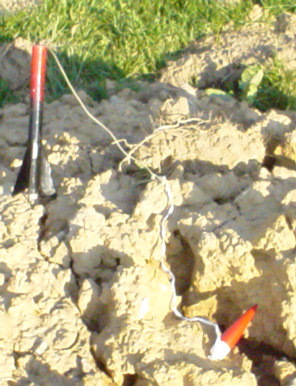| Construction Rating: | starstarstarstarstar_border |
| Flight Rating: | starstarstarstarstar |
| Overall Rating: | starstarstarstarstar_border |
| Manufacturer: | Estes  |
 Brief:
Brief:
The Ninja was a mini-engine powered, streamer recovered Estes offering that was available from 1987 to
1998. An impressive performer, the Ninja was hurt only by the fact that it came with fiber fins and lacked a proper
engine block. I bought a Ninja for under a buck in 1994 at a hobby shop closing sale and I've had a soft spot for it
ever since. The Ninja was the rocket that made a BAR out of me.
Construction:
The kit consisted of:
- BT-20 main body tube
- BT-5 engine tube
- 2 CR-520 centering rings
- PNC-20 nose cone
- 12" streamer material
- 12" elastic shock cord
- 13mm engine hook
- Pre-cut cardstock fin sheet
Finishing:
Finishing can be as simple a matter as spraying the body tube gloss black, the nose cone gloss red and applying the
wrap decal. I went with the standard method of using thinned Elmer's Fill & Finish to kill off the tube spirals and
what little basswood grain there was. Under normal construction conditions the fiber fins would need nothing more than
a coat of paint. If you decide to build a Ninja with the stock fiber fins, consider soaking them with thin CA first.
After the sanding was done, I then I sprayed the body tube with gloss black, the nose cone gloss red and applied the
decal. Not much more to it than that.
Construction Rating: 4 out of 5
 Flight:
Flight:
My original Ninja was bought with a pack of A10-3T motors and flew four times the next day with the unpainted paper
fins growing more ragged with each landing. It was a mostly calm day and none of the high, straight flights landed more
than 50' from the launch pad. Not bad for under a buck.
My second Ninja has flown nine times on 1/2A3-4T, A3-4T and A10-3T motors depending on the size of the field. A10-3T flights are generally out of sight flights suitable for large fields or dead calm skies on a small field. The A3-4T is probably the best all around motor for respectable altitude on most fields, while the 1/2A3-4T is great for the local baseball field. Streamer recovery brings it down fairly quick, but I've had a couple of close calls with the trees in foul territory. At the moment the last flight with my newest Ninja was September of 2004. I have a nephew who has discovered my "rocket room" this past winter. Once things dry out and warm up, the Ninja will be one of the rockets that I'll bring along for his first launch.
Recovery:
Streamer recovery is the perfect choice for a bird of this size, although the landings will eventually take their
toll on the paper fins. Swapping out basswood makes the Ninja nearly bulletproof. To date the most memorable recovery
was in November of 1993 when I landed it on top of a pile of dirt at a local ballfield.
Flight Rating: 5 out of 5
Summary:
PRO: Economically mini-engine powered with a simple paint and decal scheme. The Ninja is a quick and easy build and
is a perfect choice for a kids first kit. CON: No engine block? Paper fins I can see, but the lack of an engine block
costs the kit a 1/2 point.
Overall Rating: 4 out of 5
Other:
- Either replace the fiber fins with balsa or basswood or build the stock fins up with thin CA.
- Install the missing engine block and tie in a length of Kevlar for security's sake.
- If you REALLY want the Ninja to scream, forget the 13mm mount. Use one of the centering rings as an engine block and go with an 18mm, friction-fit mount. Don't figure on getting it back though. ;-)
Other Reviews
- Estes Ninja By Ted Phipps
The Ninja is a mini-engined streak. It looks great, flies great, and can be easily customized. Like most Estes kits, it comes in a plastic bag. The fins are heavy cardstock. The instructions and diagrams are very good, and construction is simple and straightforward. Estes shock cords are always too short, replace it with sewing elastic at least twice the body length. I also ...
 |
 |
Flights
Sponsored Ads
 |
 |









